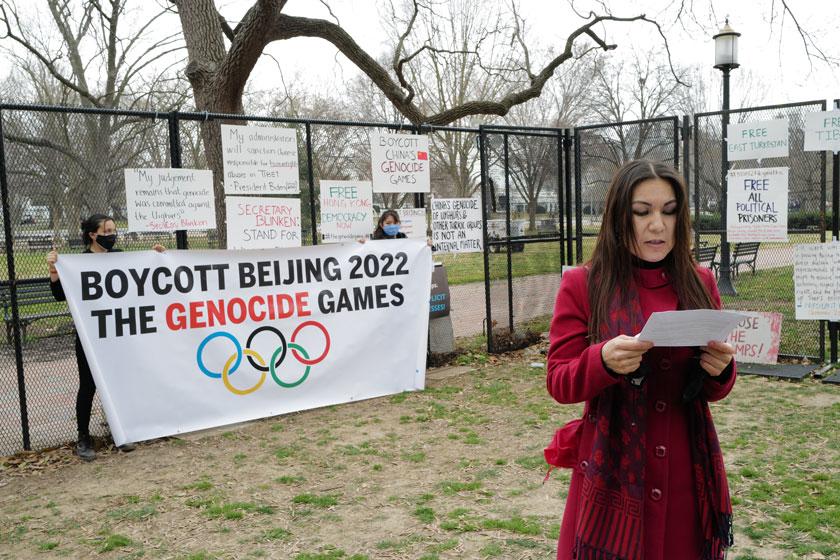Journalists Reflect on Uyghur Crisis

Washington Report on Middle East Affairs, 19 August 2021
Below is an article published by Washington Report on Middle East Affairs.

The Atlantic Council’s Strategic Litigation Project hosted a July 28 online discussion with BuzzFeed’s Megha Rajagopalan, recipient of a Pulitzer Prize for her reporting on the Uyghur atrocities, and Berlin-based independent journalist Ben Mauk, who received the inaugural Jamal Khashoggi Award for Courageous Journalism for his coverage of the persecution of minorities in Xinjiang.
Based on her interviews, Rajagopalan learned that most people taken to Chinese internment camps in Xinjiang never go through any legal process whatsoever. “Many people have described being given a knock on their door in the middle of the night. There is no arrest paperwork, no trial, no access to a lawyer,” she said. According to a January 2021 report by Human Rights Watch, 1.2 million Uyghurs of East Turkistan are being forcibly held in camps.
Satellite images show the government has constructed large security facilities over the past two to three years. “I don’t think anyone would build compounds like that if they did not have the intent to incarcerate people for a long period of time, because these compounds look to be specifically built for that purpose,” Rajagopalan observed. “I think that tells you something about the government’s intentions” for the future, she added.
The digital and physical surveillance in the city of Kashgar was what really stood out to Rajagopalan on her 2017 trip to Xinjiang. “I have been to North Korea and Myanmar, and even compared to places like that it was just unlike anything I had ever seen anywhere,” she said.
“Walking down the street and not hearing any sound—no music coming out of stores or restaurants like you would hear in any other city in China,” was disconcerting, Rajagopalan recalled. “The surveillance cameras were everywhere. There were checkpoints where Uyghurs and Han Chinese got into two different lines. Minorities would have their cell phones scanned with a device, but Han Chinese people wouldn’t.”
Unfortunately, “there is still so much happening there that we don’t know about,” she lamented. “The ways that we have to get information about what is happening on the ground there are more limited than they were two years ago,” she noted. In addition, many journalists have lost their accreditation and access to the region.
In 2018, while covering China’s Belt and Road Initiative on the border between Kazakhstan and Xinjiang, Mauk was astonished to learn there was a “tremendous amount of fear, concern and self-censorship around China’s policies” on both sides of the border. In the past, ethnic Kazaks and Uyghurs crossed freely from one country to the other to visit family members and conduct economic activity.
The information Mauk collected from survivors and witnesses of the extrajudicial detention drive in Xinjiang formed the basis of his article, “Inside Xinjiang’s Prison State” for The New Yorker and the documentary “Reeducated” that he co-developed.
Moderator Rayhan Asat, a nonresident senior fellow at the Atlantic Council’s Strategic Litigation Project and a Uyghur human rights attorney, posed a question on China’s agenda to export its surveillance techniques to other nations.
“Private companies, state-owned companies and companies that take subsidies from the state” are all involved in the surveillance regime, Rajagopalan noted. “It’s important to look at how multinationals from the U.S., Japan, Israel and various countries in Western Europe are also developing surveillance technologies…with very few legal controls on how those products can be sold and used.”
The surveillance in Xinjiang is not unique to China, Mauk added, although in Xinjiang there is no civil society or non-governmental check on the Chinese government’s ability to act on the information gathered via surveillance technologies.
“I think at this point everyone knows that the Chinese state is carrying out a genocide against Uyghurs, Kazaks and other groups indigenous to the Xinjiang Uyghur Autonomous Region,” Asat stated. “While China is the ultimate perpetrator of these terrible crimes, the silence of global bystanders, including the vast majority of world leaders, has allowed this genocide to continue. China’s economic might coupled with its influence in the world has created a permissive environment for atrocity crimes.”

